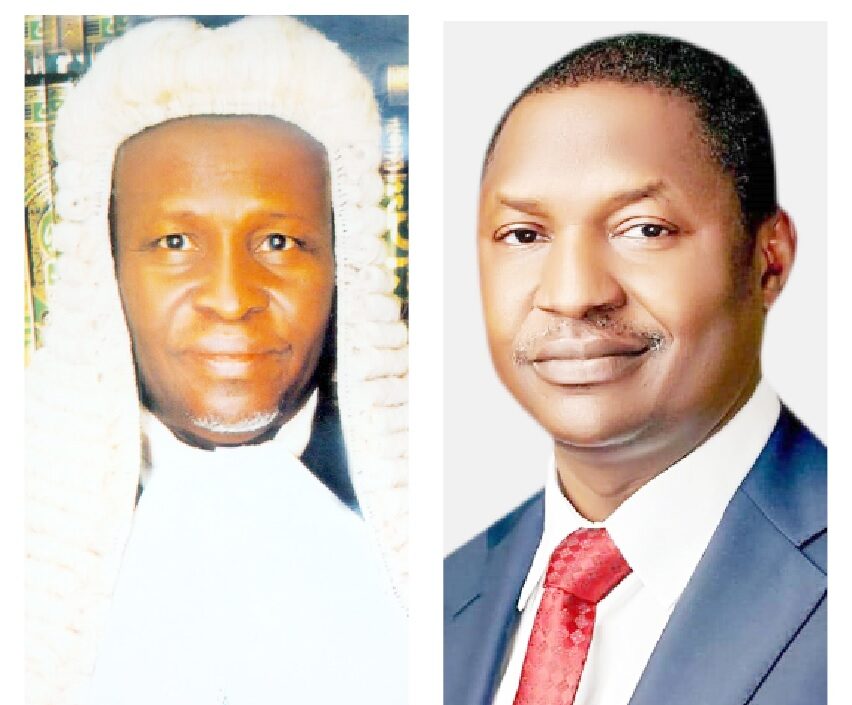Lawyers have described disobedience of court judgments by authorities and institutions of government as a major setback to Nigeria’s democracy and rule of law.
The courts have survived many years of military rule in Nigeria which raised hope that under a democratic system of government, the judicial arm would fare better in terms of safeguarding the sanctity of the binding decisions of courts on matters they adjudicate.
However, experts say the indices of respect for the principles of separation of powers, human rights, and adherence to the rule of law have severally been abused and violated in the country under the democratic dispensation.
Between 2015 and 2019, the prolonged detention, despite court orders, of a former NSA, Sambo Dasuki; leader of the Islamic Movement in Nigeria, Ibrahim Zakzaky, leader of the IPOB, Nnamdi Kanu; leader of #RevolutionNow movement and publisher of Sahara Reporters, Omoyele Sowore, among several others signposts instances of rule of law violation in Nigeria.
Human rights lawyer Femi Falana (SAN) said the federal government has disobeyed 150 judgements from various courts while suggesting that the Nigerian Bar Association (NBA) open a black book in every state to enter the names of state attorneys general that do not obey court orders.
According to him, “cases won against governments are merely psychological victories because no attorney general will grant permission to enforce the judgements.”
The Executive Secretary of the National Human Rights Commission (NHRC), Dr Anthony Ojukwu (SAN), said “we should start holding officials responsible if any court judgement is not obeyed in their areas.”
In his view, the chairman of the NBA Section on Public Interest and Development Law (SPIDEL), Onyekachi Ubani, said Nigerian leaders across various arms and agencies must redirect the country towards good governance, especially as many have abdicated their responsibility in the area of constitutional provisions in Chapter 2 which have been non-enforceable.
“As fundamental as these socio-economic rights as provided in the constitution appear on the face value, the same constitution divests the courts of their enforcement,” he said.
A fellow of the National Judicial Institute (NJI), Abdul Yusuf, said the enforcement of judgements has proven to be difficult as getting a judgement is an entirely different factor from its enforcement.
“The onus, therefore, lies on all stakeholders to be diligent and vigilant and be accountable in the discharge of their respective duties,” he said.
“Judgements delivered by the courts of competent jurisdiction must be enforced to the later, irrespective of persons, group of persons, or juristic persons, as the case may be. Justice, according to the popular maxim, must not only be done but manifestly be seen to have been done.”
He explained that from time immemorial, “the law court has been recognized as a bastion of hope, especially to the poor and downtrodden, adjudicating between or among contending parties and interpreting the laws of the land as part of its core functions as an independent judicial arm of government and as required by the prevailing constitution.
“It is important to note that the mode of enforcement which the judgement of the judgment creditor picks should be tailored towards the kind of remedy which was given.
“The power of the court to enforce and ensure compliance with its judgement or order is laid down in Section 6(6)(a) of the 1999 Constitution which provides that the judicial powers of the court ‘shall extend notwithstanding anything to the contrary in this constitution to all inherent powers and sanctions of a court of law’.”
Section 6(6)(b) goes further to provide that the power ‘shall extend to all matters between persons or between government or authority and to any person in Nigeria, and to all actions and proceedings relating thereto, for the determination of any question as to the civil rights and obligations of that person.’
Also, Ajibola Afolabi Esq, who is a fellow of the NJI, said the certainty of judicial pronouncements in a country creates a legal environment that encourages foreign direct investment, which in turn leads to jobs creation and development.
“It goes without saying, therefore, that as a country which lays emphasis on direct foreign investments, foreign investors need to be confident that Nigeria’s legal terrain is secure enough to conduct business.”
Afolabi expanded the above submission with a quote from Fidelis Oditah, “‘just as economies are underpinned by trade, so trade is underpinned by the fabric of the law and the civil justice system.
“‘The law itself provides the basic structure within which commerce and industry operate.’”
Oditah further asserts that “A steady neglect or decline of the rule of law in many developing countries has been a major reason for the decline in the development prospects of such countries.
“If foreign and domestic investors lose faith in the ability of our law and the judicial system to protect their investments and property rights or to adjudicate disputes in a timely and fair manner without undue or improper influences, they would be reluctant to invest.
“The result would be a flight of capital to other countries where these values are given greater primacy.”

 Join Daily Trust WhatsApp Community For Quick Access To News and Happenings Around You.
Join Daily Trust WhatsApp Community For Quick Access To News and Happenings Around You.


